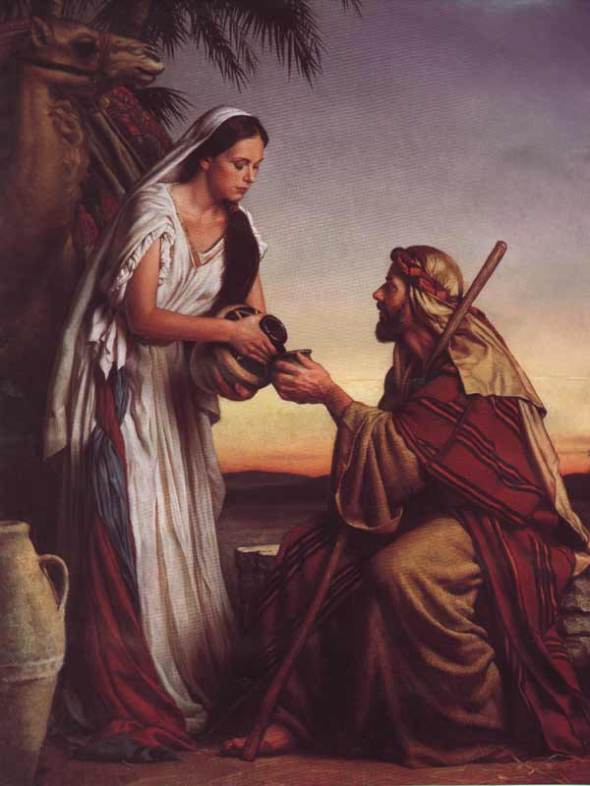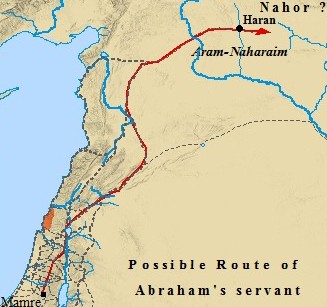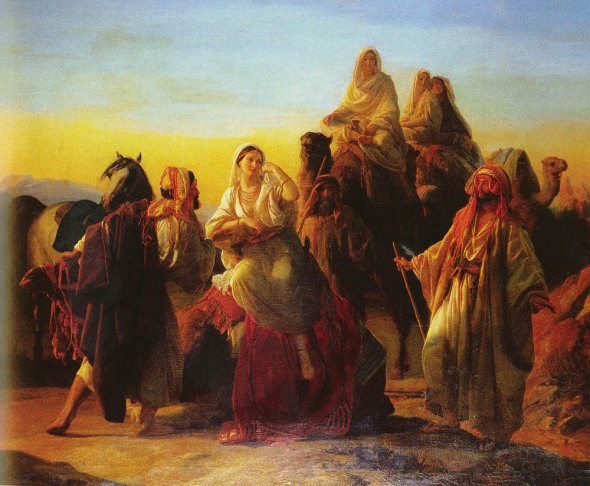Story of Isaac and Rebekah Shows God’s Providence
Posted: December 16, 2011 Filed under: Bible Study, God's will, Intercession | Tags: bride, faith, guidance, Holy, Isaac, marriage, providence, rebekah, servant, Spirit, wedding 4 CommentsIn Genesis, chapter 24, we find one of the Bible’s greatest love stories. But the real love story is not that between Isaac and his bride, but the love of God toward his people, and his regard for his promises.
As the story opens, the patriarch Abraham faces a difficult dilemma. Sarah, his wife, has died; and he, too, will soon depart this life. God had promised Abraham that he would become the father of many nations, and that his offspring would one day possess the land of Canaan. Abraham was concerned for their well-being.
We of Twentieth Century America can scarcely grasp the importance of this situation. In Abraham’s time, the wife who was barren lived in shame. The father without sons was bereft. Abraham and Sarah had had to wait many years for a son, and had staked their whole future on him.
Abraham saw clearly one great threat to future generations: their mingling with the Canaanite people who surrounded them. The Canaanites were idol worshipers, given over to reprobate minds, practicing all manner of perversion akin to that of Sodom and Gomorra.
Abraham’s son, Isaac, was not yet married. Isaac still grieved over his mother’s death. Abraham was afraid this would lead Isaac to take comfort in marriage. If Isaac married one of the local girls, she might lead their children, and perhaps even Isaac himself, into her idolatrous worship.
Abraham knew he must act fast. He must find a proper wife for Isaac. He must rely upon the Lord’s guidance and provision.
He saw only one course: to choose a maiden from Chaldea, his homeland. More than that, she must be from among his relatives, for they alone worshiped the one true God.
But Abraham was too old to make the long journey himself. So he called upon his chief steward, his oldest and most trusted servant, to go in his stead.
Abraham thoroughly instructed the servant in his task. Most emphatically, he warned the servant that he must under no circumstances take Isaac to Chaldea with him. Should Isaac decide to stay in Chaldea, he would be turning his back on God’s promise. God had sent Abraham to establish his seed in Canaan. Isaac must not renege — he must keep the covenant with God.
The servant chose from his master’s riches all that he would need for the task. He made up a caravan of ten camels for the long journey, laden with many fine gifts for the bride and her family, as was the custom. Then he went forth in faith, bearing this one promise from Abraham and his God: “He shall send his angel before thee, and thou shalt take a wife unto my son from there” (Genesis 24:7).
The servant saw no reason to doubt this promise. He had probably served Abraham from his youth. He might have been with Abraham as God led him out of his native land into the unknown and forbidding land of Canaan many years before (Genesis 12). He might have been at Abraham’s side as he rescued his nephew Lot from the invading armies of four kings (chapter 14). And he might have been a witness as Abraham led the young Isaac off to the land of Moriah, thinking he would have to offer his son in sacrifice (chapter 22). The servant had seen God richly reward Abraham for his faithfulness and graciously forgive his indiscretions. He had seen God at work in his master’s life, and did not doubt that God would honor his mission.
The servant made the long journey north to Haran, across the Euphrates, where Abraham’s relatives still lived. They were the descendents of Nahor, Abraham’s younger brother. But it had been decades since Abraham had left Haran. The servant had no idea how to contact the family, much less how to choose a bride from among them. Arriving at Haran, he went first to the village well, a local gathering place.
So we see him now, standing beside the well, unsure of his next move. He has done all that he can do in his own power at this point, but he has come by faith into the place of decision. He has entered into that highly desirable position in which he can rest, and watch the God of Abraham do his work. Where man’s work ends, God’s begins.
The servant began to seek God’s guidance. He prayed that the Lord might identify the chosen maiden by a sign. He asked that, when he asked a maiden for a drink of water, the chosen one would not only give him a drink but go so far as to offer to water his camels, as well.
It so happened that the sign was fulfilled by the very first maiden he asked! She not only gave the servant a drink as requested, but also watered his camels. She turned out to be Rebekah, the granddaughter of Nahor, Abraham’s brother.
The servant was dumbfounded by the promptness of God’s answer! How amazing are the workings of God! What are the chances of such a meeting taking place? What are the odds against such perfect timing, that the servant arrived at just the right moment, and that Rebekah was the first girl he met, when the other women were also coming out to draw water? (see Genesis 24, verse 11).
(Some people suppose that such “miracles” are only coincidences. But isn’t it interesting that so many more “coincidences” happen to believers than to unbelievers?)
Still, the servant was not quite satisfied. His task was not yet complete. Scripture says that he “held his peace, to learn whether the Lord had made his journey prosperous or not” (verse 21). The servant seems here to have known quite a bit about human nature, and about God’s workings in men. He had arrived, he knew, at the right place at the right time. He was totally in God’s will and had found God’s chosen bride. But people all too often short-circuit God’s perfect will by their own stubborn willfulness. Would she agree to go with him?
As Abraham’s representative, the servant began to woo Rebekah according to the ancient customs. He gave her a ring and two bracelets of fine gold as tokens, and inquired of her family. Here we have an inkling of the Lord’s workings in Rebekah’s heart, in that she was eager to bring the man to lodge in her father’s house and to introduce him to the family. Likewise, when Rebekah had run to tell her family what had happened, they were eager to meet him.
The servant, arriving at their house, told his story. Abraham, his master and their kindred, a man blessed of God, had sent his servant to find a wife for his son, Isaac. An angel had prepared the way before him, and the chosen bride, Rebekah, had been shown him by a sign.
As God had prepared Rebekah’s heart, so was her family eager to accept his proposal. He was urgent in his request: He would not stay an extra day, but insisted that she return with him immediately. The faithful servant could see nothing and think of nothing but the task his master had set before him. Ultimately, her family left the decision up to the girl: “And they called Rebekah, and said unto her, Wilt thou go with this man? And she said, I will go” (verse 58).
So Rebekah went with the servant to the land of Canaan to be Isaac’s wife. Isaac loved her, and was comforted over the death of his mother. When Rebekah was barren, Isaac prayed, and she bore him twin sons, Esau and Jacob. Esau fathered the nation of Edom, and Jacob became the father of Israel.
From this beautiful story, we can learn many lessons on faith. Abraham had walked with God throughout his long life. As he obeyed God in small things, God led him into greater things, taught him the way of faith, and blessed his efforts. Since God had always proved to be a faithful provider, Abraham had no reason to doubt that he would also find Isaac a wife. So Abraham received the promise that God would prepare the way.
The servant, also, had seen God’s provision and his blessings. He knew God cared for his master and would answer his prayer. Therefore, he went forth in full assurance of faith. He didn’t falter when he had done all he knew to do, and did not know whether to turn to the right or the left. Rather, he turned his eyes upon God, and waited expectantly for the answer. He put aside all consideration of self and set his sights on the task. He did not seek for his own glory — his name is not even mentioned in the account — nor for his own pleasure, but only to do his master’s will.
Some interpreters see in the servant a “type,” or example, of the Holy Spirit. Jesus said the Spirit “shall not speak of himself” but “shall glorify me; for He shall receive of mine, and shall show it unto you” (John 16:13, 14).
Then Rebekah, like the servant, was led by the Holy Spirit into the place of decision. She recognized the call of God upon her heart and responded. Though faced with a situation of great uncertainty — that of traveling to a strange and distant land to marry a man she had never seen — she obeyed the voice which spoke to her heart, that voice which was distinct in that it whispered to her of things apart from her own nature, her own desires, knowledge, and discernment. She chose to walk by that spirit of faith which had been engendered within her. And being found faithful, she also received her reward.
Scripture says of Abraham, “He staggered not at the promise of God through unbelief, but was strong in faith, giving glory to God, and being fully persuaded that what He had promised, He was also able to perform. Therefore, it was imputed to him for righteousness” (Romans 4:20-22).
We, too, should not falter in unbelief, but should stand strong in faith and glorify God in adversity.
We should be firmly convinced that God is faithful in his promises.
And as we believe and our faith grows, the glory of it shall be added to our account. Amen.
Originally published in the Polk County Enterprise, October 20 and 27, 1991.
©1991, 2011 Paul A. Hughes





Thank you Jesus!!! When I was at the point of……He showed me this story in the most amazing coincidence(no way, it’s a miracle, it’s His Providence in MY life)!!! Thank You Jesus!!!!!!!
[…] Image from: https://biblequestion.wordpress.com/2011/12/16/story-of-isaac-and-rebekah-shows-gods-providence/ […]
Reblogged this on God's Enduring Love and commented:
I love to read the love stories in the Bible. All are significant in that they demonstrate God’s Providence and Power to bring forth His plan and purpose for man.
Thank you Lord for this love story,i learnt alot…i need to walk by spirit and not by the desire of flesh.!! need to be dependent on God‘s promises…